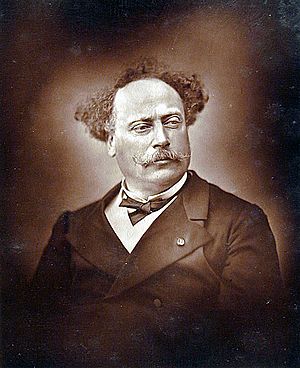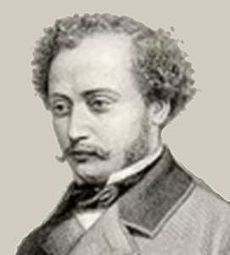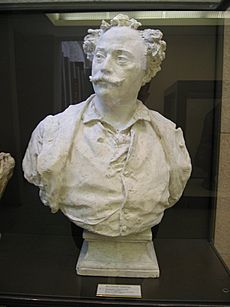Alexandre Dumas fils facts for kids
Quick facts for kids
Alexandre Dumas fils
|
|
|---|---|

Alexandre Dumas fils
|
|
| Born | Alexandre Dumas 27 July 1824 Paris, France |
| Died | 27 November 1895 (aged 71) Marly-le-Roi, Yvelines, France |
| Resting place | Montmartre Cemetery |
| Occupation | Writer, novelist, playwright |
| Period | Romanticism |
| Genre | Historical novel, romantic novel |
| Notable awards | Légion d'honneur (1894) |
| Spouse |
Nadezhda von Knorring
(m. 1864; died 1895)Henriette Régnier de La Brière
(m. 1895) |
| Children | 2, including Colette Dumas |
| Parents | Alexandre Dumas Marie-Laure-Catherine Labay |
| Relatives | Alexandre Lippmann (grandson) Thomas-Alexandre Dumas (grandfather) |
Alexandre Dumas fils (born July 27, 1824 – died November 27, 1895) was a French author and playwright. He is most famous for his romantic novel La Dame aux Camélias (The Lady of the Camellias), published in 1848. This book was later turned into Giuseppe Verdi's famous opera La traviata in 1853. In English, the story is often known as Camille.
Dumas fils means 'son' in French. He was the son of Alexandre Dumas père ('father'), who was also a very famous writer. His father wrote classic books like The Three Musketeers. Alexandre Dumas fils became a member of the Académie française (French Academy) in 1874. He also received the Légion d'honneur (Legion of Honour) in 1894, which is a very high award in France.
Contents
Biography
Early Life and Education
Alexandre Dumas fils was born in Paris, France. His mother was Marie-Laure-Catherine Labay, a dressmaker, and his father was the famous novelist Alexandre Dumas. In 1831, his father officially recognized him as his son. This allowed young Dumas to get an excellent education at schools like the Institution Goubaux and the Collège Bourbon.
At that time, the law let his father take him away from his mother. This sad event deeply affected Dumas fils. It inspired him to write about strong female characters who faced difficult situations. In his plays and novels, he often showed how important it was for people to act responsibly. For example, in his play The Illegitimate Son (1858), he wrote about a father's duty to his child.
While at boarding school, other students sometimes teased him about his family background. These experiences greatly shaped his thoughts, how he behaved, and what he wrote about.
Family Background and Heritage
Dumas fils had an interesting family history. His great-grandparents on his father's side were Marquis Alexandre-Antoine Davy de la Pailleterie, a French nobleman, and Marie-Cessette Dumas, an African slave from the colony of Saint-Domingue (now Haiti).
Their son, Thomas-Alexandre Dumas, became a very important general in the French army during the French Revolution. This means Alexandre Dumas fils had a diverse heritage, connecting him to both French nobility and African roots.
The Lady of the Camellias
In 1844, Dumas moved to Saint-Germain-en-Laye, near Paris, to live with his father. There, he met a young woman named Marie Duplessis. She became the inspiration for the main character, Marguerite Gauthier, in his famous romantic novel La Dame aux camélias (The Lady of the Camellias).
This novel was later turned into a play, which was called Camille in English. It also became the basis for Verdi's 1853 opera, La traviata. In the opera, Marie Duplessis's character was renamed Violetta Valéry.
Success as a Playwright
Even though Dumas fils said he adapted his novel into a play because he needed money, it became a huge success. This play launched his career as a dramatist. During his lifetime, he became even more famous than his father. He was a leading figure in French theater for much of the second half of the 19th century.
After this success, he mostly stopped writing novels. However, his semi-autobiographical novel L'Affaire Clemenceau (1867) was also quite popular.
Later Life and Achievements
On December 31, 1864, in Moscow, Dumas married Nadezhda von Knorring. They had two daughters: Colette Dumas (born in 1860) and Jeanine Dumas (born in 1867). After Nadezhda passed away, Dumas married Henriette Régnier de La Brière in June 1895.
In 1874, he was honored by being admitted to the Académie française, a very respected institution for French language and literature. In 1894, he received the Légion d'honneur, a top award in France.
Dumas fils passed away in Marly-le-Roi, Yvelines, on November 27, 1895. He was buried in the Montmartre Cemetery in Paris. Interestingly, his grave is not far from where Marie Duplessis, the inspiration for his most famous work, is buried.
Images for kids
See also
 In Spanish: Alexandre Dumas (hijo) para niños
In Spanish: Alexandre Dumas (hijo) para niños
 | Janet Taylor Pickett |
 | Synthia Saint James |
 | Howardena Pindell |
 | Faith Ringgold |




